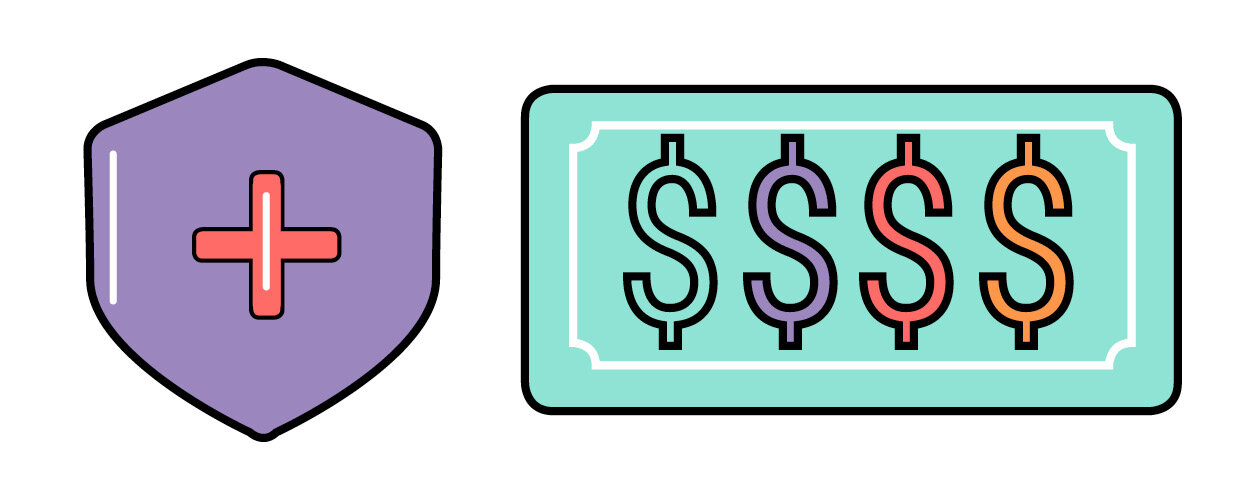Have you ever received an unexpected or expensive medical bill? We have, and it STINKS. While getting a pricey medical bill is never fun, there are a few tips we recommend taking to better understand the bill and possibly manage or reduce some of the costs.
Make sure the amount listed under “Patient Owes” on the bill matches the Explanation of Benefits (EOB) from your insurance company.
Tip: The Explanation of Benefits (EOB) outlines the services you received, the amount insurance paid for them, and the amount you owe. It also provides a more general summary of your account, including how much is remaining in your deductible and out-of-pocket maximum. Check out our post on Explanation of Benefits to learn more.
Things to Look For:
“Amount You Owe” or “Total Patient Responsibility”: This should match the amount on the bill from your provider
“Not Covered” or “Not Payable By Plan”: If you get a bill from the provider for any amount listed as “not covered or not payable by plan” on the EOB, look for more details. Usually the EOB will state why something wasn’t covered, and will state if the provider is allowed to bill you for it or not. Oftentimes, you can call the provider to negotiate or drop these uncovered charges.
“Out-of-Network”: If your provider is listed as out-of-network but you thought they were in-network, call your provider and insurance company to double-check. Oftentimes, providers work under several federal Tax ID numbers, and some of those may be in-network while others are out-of-network. Even if they can’t rebill or reprocess as in-network, the provider may try to match the in-network rate.
Tip: If the bill really doesn’t make sense, don’t be afraid to give your insurance a call to make sure that everything was processed properly on their end. This has saved one of your Healthcare Hustlers a few thousand dollars previously because of an insurance processing error.
Call the Medical Billing Office
The medical billing office wants to collect as much as possible, as quickly as possible. You can approach them with one (or several) of the following options:
If you don’t have insurance
Ask for a “self-pay discount.” This is a discount often given to patients who don’t have insurance to make the cost more manageable. Billing offices will usually knock 20%-60% off the total cost.
Talk to a Healthcare Navigator to see if you qualify for Medicaid. You may be able to retroactively apply your Medicaid benefits to that previous claim. If you want to check your eligibility, contact a Healthcare Navigator or talk to your local Medicaid office.
If you can afford to pay the bill, just not all at once: Ask to be set up on a monthly payment plan. The billing office will break down the total cost of the bill into more manageable monthly installments. Depending on their policy, they can stretch your bill out for 12+ months.
If you cannot afford to pay the bill and/or have financial hardship
Ask about their “patient assistance” or “charity care” programs. The billing office will review your financial situation and may write off a large portion of the bill if you qualify.
Talk to a Healthcare Navigator. Anyone can schedule a free appointment with a Healthcare Navigator. They will walk you through your eligibility for Medicaid - you might be unknowingly be eligible for. If you do qualify, you may be able to retroactively apply your Medicaid benefits to the previous claim. Find your local Healthcare Navigator here. Hint: Try to work with an “Assister” rather than a “Broker.”
If you can afford to pay the bill in full now: Ask for a “Prompt Pay” discount. Most billing offices are thrilled to collect the full amount within the first 30 days of the statement and may give you a 5%-20% prompt pay discount if you ask, make sure to pay in full immediately.
Additional Things to Know:
Many hospitals will not send a bill to collections for at least 90 days from the date of the initial bill (call your billing department to make sure).
Being friendly and honest about your ability to pay will get you further. As easy as it is to demonize the people at the billing office taking your calls, they usually have to follow the policies and procedures put in place by their department.
The number to the billing office should be listed on your bill.
Is your bill already in collections? Check out additional tips here.
If you’d like to appeal to insurance, check out this guide.
Read these posts to avoid future unexpected bills:

